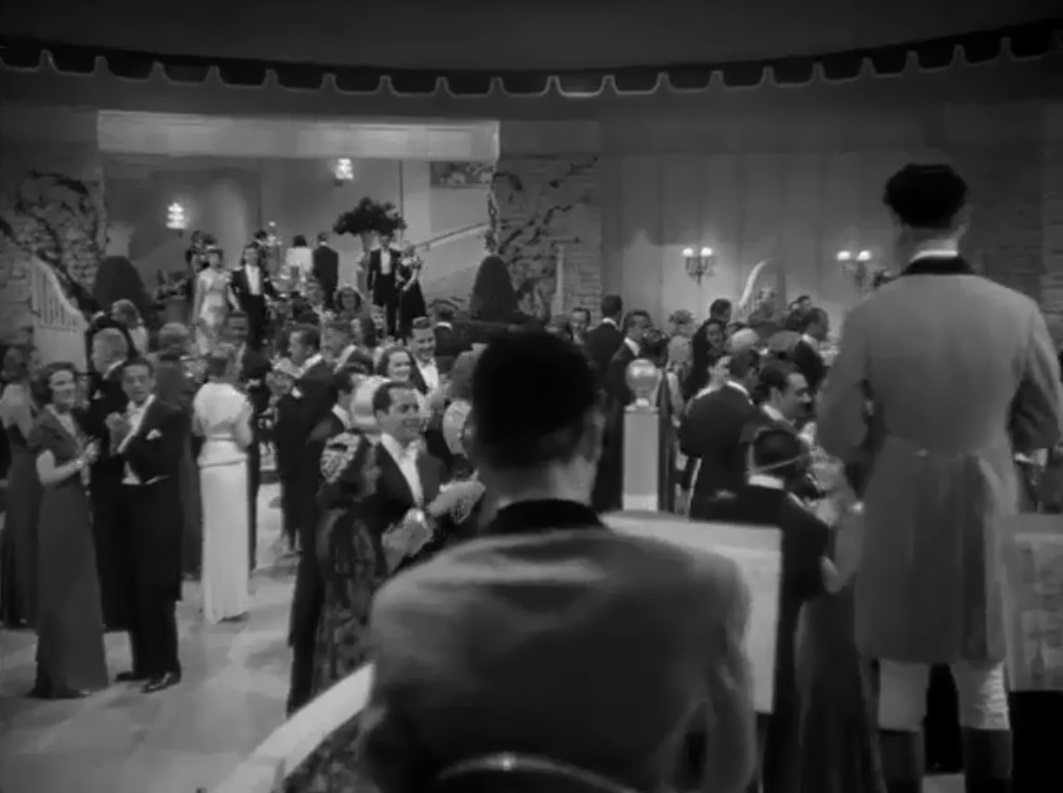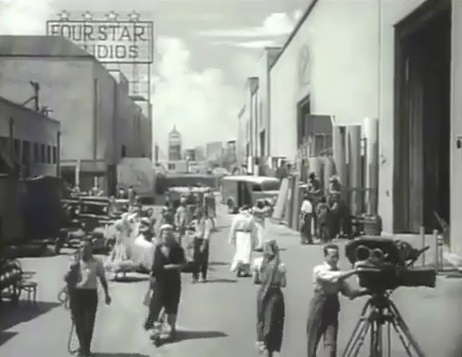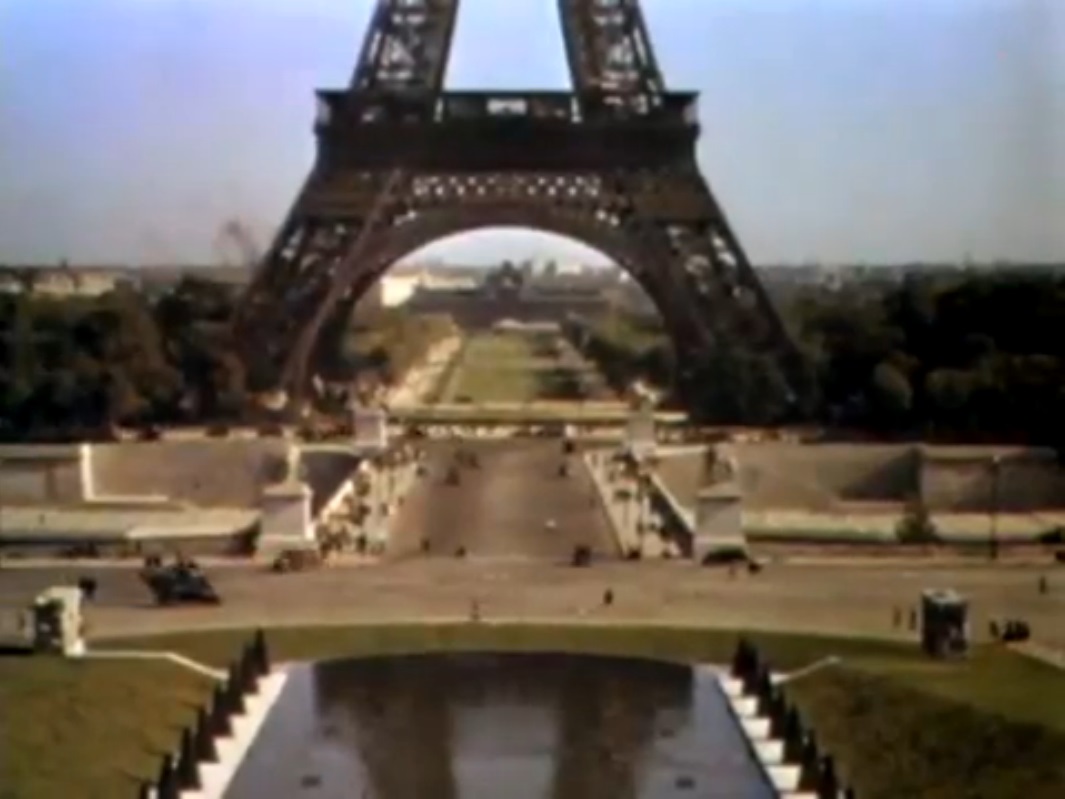Straight
Place and Show

The girl loves a
thoroughbred, name of Playboy, fiancé fouled up, society set.
By Damon Runyon,
out of left field. “IF I’VE GOT TO HAVE A HORSE
I WANT BOTH ENDS OF HIM”, she wires a friend. Cf. Capra, Broadway Bill
or It Happened One Night, also
Castle, Texas, Brooklyn & Heaven.
The Ritz Brothers
play themselves, almost beyond the ken of man or beast. “The guy
rehearses one way, and wrestles another!” Cp. The Great Dan Patch (dir. Joseph M. Newman).
The famous
question of a jockey...
Halliwell’s Film Guide, “lively, unpretentious”.
That’s
Right—You’re Wrong

“Imagine a
night in Venice, the Grand Canal, moonlight, slowly a gondola drifts into the
scene and in it we see...”
And so,
unmistakably, Max Ophuls’ die verliebte firma. transferred to Hollywood with Kay Kyser and his grandmother May Robson (the original Apple
Annie) for Adolphe Menjou and Andrea Leeds in The Goldwyn Follies (dir. George Marshall), and Menjou is assigned
to this picture at Four Star Studios as producer, strictly from falling profits. “I don’t feel
very much like singing.”
“You don’t
feel like it—did you ever hear
of Pagliacci? Did he feel like singing?”
The College of Musical Knowledge, Ginny Simms, Harry Babbitt, Sully
Mason, Ish Kabibble and the
two writers (“you know, uh, they won the Academy Award last year”) portrayed
by Hobart Cavanaugh and Edward Everett Horton, also Dennis O’Keefe the manager
and Lucille Ball the glamour girl, “she thinks you’re Jack Benny!”
“Aren’t
pictures fun?”
“Say, ya
don’t think—”
“Why not, there’s a chance, isn’t there?” Critics have had a good deal of trouble following the
plot, TV Guide for example has it
that “things look grim for the band until starlet Ball falls in love with
band manager O’Keefe and insists that the band be included in her next
movie. Yes, and it’s a big hit.”
Frank S. Nugent of
the New York Times, “might have
been a sprightlier spoof of Hollywood production methods than it is, and it
might have been a more laborious and cumbersome one.” Leonard
Maltin, “amiable... much of the humor (and
music) is dated, but there’s plenty to enjoy in the supporting cast,
including gossip queens Sheilah Graham and Hedda
Hopper as themselves.” Pat Graham (Chicago Reader), “the director is
David Butler, who showed sparks of imagination early in his career... but never
quite hit his stride.” Catholic News Service
Media Review Office, “dated musical comedy”. Halliwell’s Film Guide, “one
of the best,” citing Variety, “will
satisfy as a bill-topper.”
A great big sissy of a movie actor falls for the
colonel’s daughter.
Hollywood
star satire (“oh stop, you sound like an unpopular song”) goes no
further than the fellow with an unregistered alien as housekeeper (“they
have enough aliens”), two swimming pools (“that’s last
year’s”), and a deathly fear of loud noises.
Bob Hope
and Dorothy Lamour, with Lynne Overman his agent and Eddie Bracken his
chauffeur.
Butler’s
rich style secures fast comedy in a peacetime training camp.
Road to Morocco
The polished dreamlike brilliance of the palace set
invokes the Taj Mahal and Persian miniatures, costumes by Edith Head adorn the
players, so that The Sheik and no other abducts the Princess.
A comedy
on “smoking in the powder room”, stowaways, shipwreck, slavery,
astrology, tyranny, Liberty, and thespianism.
It’s a
Great Feeling
Hollywood is a
very serious, real place where top people in the business ply their trade.
Butler opens with four aces, Raoul Walsh, Michael Curtiz, King Vidor and
himself to show this. The scene is Warner Brothers, cool and sophisticated,
Western, modern. In its midst and strictly from hunger is Jack Carson, an
emptyheaded windbag, a sharpie, a whirlwind no-one wants to work with, the
antithesis of professionalism and artistry.
Mademoiselle
Fifi has to be directed by him, he
needs the money (cf. Douglas
Sirk’s Slightly French). Jane Wyman faints at the suggestion that she play the
leading role, his co-star Dennis Morgan wants out and has a train ticket for
New York with a new song for a show on Broadway.
Judy Adams (Doris
Day) works at the commissary, the Green Room, she’s trained for a break
in the movies but no producer will listen. Variety publishes the story
of Carson’s first assignment as director, she forces an audition upon him
and gets a job playing Mrs. Jack Carson to Morgan, who signs for the film at
her pleading. “The usual malarkey,” she’s been promised a
part, why not Fifi? They bug the producer with her everywhere, mount a
publicity campaign as Yvonne Amour, “Star of the
Comédie-Française”, film a disastrous screen test, the producer has a
nervous breakdown and cancels the film, cp. That’s Right—You’re Wrong.
On the train back
home to Wisconsin, she sings alone at night in the club car. The
insomniac producer is on a forced vacation (“who wants to put the knife
in me?”) and riding the same train, he is altogether impressed and wants
to sign her to the restarted production, but she wants nothing better now than
to marry her beau, Jeffrey Bushdinkel, who in the last shot is revealed to be
the spitting image of Errol Flynn (cp. The
Boy Friend, dir. Ken Russell).
This is a Butler
specialty, that rare example of a film so agreeably well-made that it has
passed notice as a masterpiece without gaining an unfavorable response.
The Story of Seabiscuit
Horse and jockey
are specifically identified as a parallel unity, the fictional apparatus is a
projection of the horse through a medium of understanding. The Irish trainer
spots the colt in a bunch, culls it against disbelievers in its unusual
conformation, the jockey loves his niece, she won’t reciprocate because
her brother died at the Grand National with his horse over a hedge and into the
water. Peter Falk said of a similar case, “the fucker never come
up”.
Seabiscuit will
beat anything but doesn’t care to, “he’s too friendly, too
sociable for his own good.” In the famous match against War Admiral,
he’s trained to come out of the gate at a gallop. Butler tints sepia to
sort with the news footage, Seabiscuit leaves his great rival behind, eyes
forward, flashing fire.
Around this
portrait of the thoroughbred the film is built (the statue unveiled at Santa
Anita has the same expression). The two leads are commandingly portrayed, Barry
Fitzgerald is continually regarded as the man of genius in the force of
circumstances, a Ulysses of resourcefulness. A dull Kentucky trainer
doesn’t know his business, the proprietor smoothes things out equably,
“but where’s the horse?” Off to California, a warmer climate,
rich sporting couple, the Irishman’s credentials, a fair shake and
careful training.
The niece is a young
lady of the Nineteen-Thirties, played by Shirley Temple in advance of la
Bardot.
Lon McCallister
portrays the jockey as working athlete (the rare appreciation of jockey arcana
is partly a function of the dramatic arrangement), the rest of the cast is
skillfully fitted by Butler into precise moments of the script revealing
character and coping with the exigencies of the drama.
Butler is a
director whom other directors know and admire. The niece is new in this
country, studies nursing at a Kentucky hospital. The jockey picks her up after
work, they converse beside his car in front of the hospital, the identical shot
has them in front of her home, no-one will notice how
easily her circumscribed life is shown.
“A.W.”
of the New York Times completely overlooked the film, Variety
found it on the contrary quite good.
April in Paris

A sort of felix culpa in the State Department that gets
a perfect ninny married. “Can you picture Ethel
Barrymore playin’ that fleatrap
in Montreal?”
A certain
“noble experiment” on their way to the International Festival of
Arts. “To Ethiopia! And
Afghanistan!”
The countertheme happily acknowledged from Capra’s State of the Union.
A masterwork
acknowledging the blissful blessing of its title number.
Bosley Crowther of the New
York Times thought it odd “in New York on Christmas Eve” but
found in it “other diversions for a person of undemanding wit.” Leonard Maltin,
“mediocre... unconvincing...” TV
Guide, “mostly forgettable... ordinary... uproariously funny...” Catholic News Service Media Review Office,
“charmless... thin... witless...” Hal
Erickson (All Movie Guide),
“the romantic scenes, however, fail to hold up: after all...” Halliwell’s
Film Guide, “wisps of wit.”
By the Light of the Silvery Moon
Home from the
war, victorious (doughboys dance in the train aisles wearing the Kaiser’s
helmets).
What to do about
marriage? There’s a daunting prospect, you’re hanging out there
like a turkey neck the day before Thanksgiving, she’s already wearing the
wedding dress.
Take a job at her
father’s bank, build a nest egg.
He’s got to
sign a French belle to the local theater (run by the bank, overseen by the
church committee), cp. It’s a Great
Feeling. A malentendu has him in love with
Marlene, or the bride with her piano teacher, and the wrong turkey on the
table.
The heightened
surreality of this left critics behind like a fast cab on Broadway, but it
didn’t matter. Butler has a complicated formula, old songs, a little
hoke, great gags, silent films, the repertoire of accommodation to any period
in Hollywood (which he extends stylistically to the whole film), so that
1918-19 dresses suddenly appear at the dance, perfectly noticeable and
perfectly fashionable.
The Bard
The Twilight Zone
A teleplay by Rod
Serling to remind one of the adverse criticism directed by Philip Roth at
Albee’s Who’s Afraid of Virginia Woolf? (“I appeal to Philip
assuaged!”), that it had nothing to do in any event with George and
Martha Washington.
This sendup of
scriveners, agents, sponsors and executives was the last, anyhow, of the fourth
season.